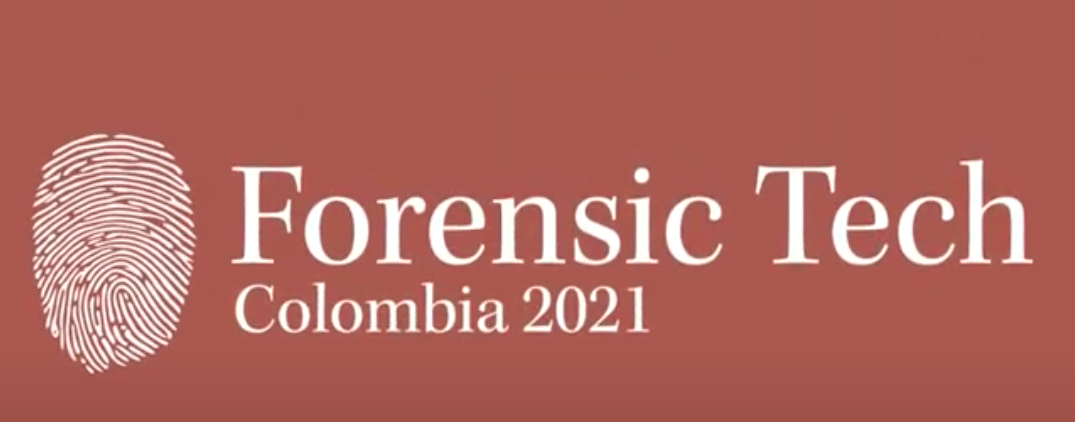
Applied statistics, human identification, and human rights in Forensic Tech 2021
Together with Universidad Externado and EQUITAS, CAPAZ is organising the second session of the international Forensic Tech Colombia 2021 seminar on November 23 – 25. The event will feature a series of keynote lectures and panels with top guests, creating an ideal opportunity to exchange knowledge on the role of forensic sciences, innovation, and technology in countries with serious cases of human rights violations.
With this in mind, the programme includes national and international guests who will exchange experiences on statistics applied to the investigation of human rights violations and innovative techniques in human identification.
November 23 will be devoted to the topic of statistics applied to investigation into human rights violations. Statistics have become a very important instrument in the formulation of public policies on investigation and crime prevention: the dissemination of reliable statistical information strengthens the demand for rights and social participation in the debate on their defence.
The three sessions held on the first day of Forensic Tech Colombia 2021 will deal with concrete experiences in the application of statistical methods for the analysis of extrajudicial executions and missing persons. At 9:00am the keynote address will be given by Patrick Ball, a member of the US Human Rights Data Analysis Group. His paper is entitled The Use of Statistics in the Investigation and Understanding of Human Rights Violations.
Register here for Dr. Ball’s lecture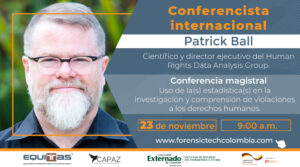
The panel “Methods for the estimation of the numbers of victims of human rights violations” is scheduled for 5:00 pm, and will include the participation of Alexander Sabogal from Equitas Colombia and Lina María Ramos from the Unit for the Search of Disappeared Persons (UBPD).
Register here to attend the panel
November 24 will be devoted to the discussion of innovative techniques in human identification. Identifying missing persons is fundamental for investigation into human rights violations. Their identification is, of course, a basic principle of humanity, but also a requirement for forensic professionals, allowing them to fully comply with their obligations to defend the rights of the victims, and thus bring justice to the survivors.
There will be two keynote lectures on this day. The first, entitled Experiences in Colombia for the genetic identification of cremated human bodies, will be given at 9:00 am by Manuel Paredes, member of the Colombia’s National Institute of Legal Medicine and Forensic Sciences.
Register here
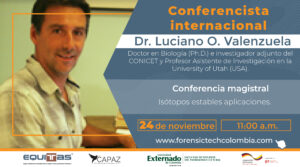
The second, presented at 11:00am is entitled Forensic applications of stable isotope analysis to support the identification of persons, and will be given by Luciano Valenzuela, member of Argentina’s National Council for Scientific and Technical Research-CONICET.
Register here
The final panel discussion at 5:00pm, will focus on Forensic Investigation in Latin America for the application of stable isotope analysis, and will include Daniela Orozco from EQUITAS Colombia, Daniel Castellanos, Researcher; Martha Palma from Peru’s Missing Persons Search Office, and Claudia Plens from the Archaeological Studies Laboratory – LEA, Núcleo de Ensino e Pesquisa em Arqueologia e Antropologia Forense Universidade Federal de São Paulo, Brazil.
Register here 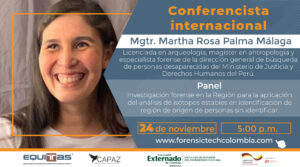
The last day will be spent contextualising the topics discussed on the first two days. Particular attention will be paid to the protests that have taken place in Colombia and in several Latin American countries, where the force used to contain these mobilisations has led, on several occasions, to human rights violations such as homicides, torture, and forced disappearances. To this end, a series of interdisciplinary initiatives that have been developed to document such violations will be presented on this last day of Forensic Tech 2021.
The panel at 9:00am, will discuss the use of information reported in social networks for the investigation of human rights violations in the context of social protest, and will include Laila AbuShihab from Universidad Externado and Editor for Vorágine, and Daniela Rea from Signa-Lab México.
Register here
At 11:00am, the keynote lecture will be on the Use of non-lethal weapons in the containment of social protest. This will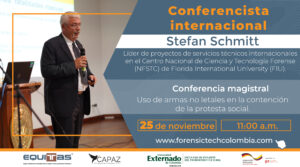 be given by Stefan Schmitt from Florida International University, USA.
be given by Stefan Schmitt from Florida International University, USA.
Register here
The final event at 5:00pm, will be a panel on Social Mobilisation in Latin America: from legitimate protest to state repression. Participants will include German Romero from dhColombia and Alonso Serradell from Amnesty International Chile.
(Some of the descriptions were taken from: http://forensictechcolombia.com)



